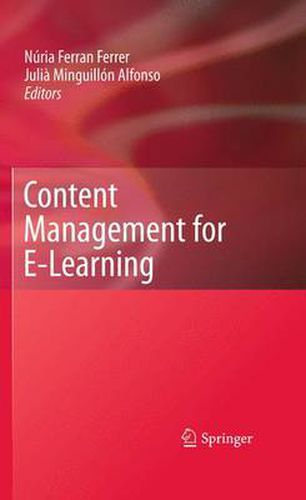Readings Newsletter
Become a Readings Member to make your shopping experience even easier.
Sign in or sign up for free!
You’re not far away from qualifying for FREE standard shipping within Australia
You’ve qualified for FREE standard shipping within Australia
The cart is loading…






This title is printed to order. This book may have been self-published. If so, we cannot guarantee the quality of the content. In the main most books will have gone through the editing process however some may not. We therefore suggest that you be aware of this before ordering this book. If in doubt check either the author or publisher’s details as we are unable to accept any returns unless they are faulty. Please contact us if you have any questions.
The increasing growth in the use of e-learning environments, in which education is delivered and supported through information and communication technologies, has brought new challenges to academic institutions. From all the current definitions of e-learning, it can be seen that learning contents are one of the key issues for a successful e-learning experience. Therefore, there is a real need for academic staff, managers and librarians to re-think the whole process of delivering courses, information resources and information services.
The book focuses on defining content management and its relationship with knowledge management, providing perspectives on how the semantic web could complement content management, how to deal with copyright restrictions, and how to describe information competencies and skills required and acquired by teachers and students in virtual environments. Offered is a design project for managing digital content for classical and distance education institutions, covering all the aspects related to the content lifecycle, integrating it into the learning process. Practical aspects such as standards for content e-learning management, a review of existing experiences of learning repositories, and a survey of available platforms for delivering courses and providing access to information resources is also covered. Lastly, the book addresses the three main factors which make it crucial in the current context: first, the web 2.0 paradigm, which breaks the content producer-consumer barrier; second, the open content movement for educational purposes, which changes the knowledge management transference model; and third, the new European Higher Education Area, where the concept of content needs to be rethought.
$9.00 standard shipping within Australia
FREE standard shipping within Australia for orders over $100.00
Express & International shipping calculated at checkout
Stock availability can be subject to change without notice. We recommend calling the shop or contacting our online team to check availability of low stock items. Please see our Shopping Online page for more details.
This title is printed to order. This book may have been self-published. If so, we cannot guarantee the quality of the content. In the main most books will have gone through the editing process however some may not. We therefore suggest that you be aware of this before ordering this book. If in doubt check either the author or publisher’s details as we are unable to accept any returns unless they are faulty. Please contact us if you have any questions.
The increasing growth in the use of e-learning environments, in which education is delivered and supported through information and communication technologies, has brought new challenges to academic institutions. From all the current definitions of e-learning, it can be seen that learning contents are one of the key issues for a successful e-learning experience. Therefore, there is a real need for academic staff, managers and librarians to re-think the whole process of delivering courses, information resources and information services.
The book focuses on defining content management and its relationship with knowledge management, providing perspectives on how the semantic web could complement content management, how to deal with copyright restrictions, and how to describe information competencies and skills required and acquired by teachers and students in virtual environments. Offered is a design project for managing digital content for classical and distance education institutions, covering all the aspects related to the content lifecycle, integrating it into the learning process. Practical aspects such as standards for content e-learning management, a review of existing experiences of learning repositories, and a survey of available platforms for delivering courses and providing access to information resources is also covered. Lastly, the book addresses the three main factors which make it crucial in the current context: first, the web 2.0 paradigm, which breaks the content producer-consumer barrier; second, the open content movement for educational purposes, which changes the knowledge management transference model; and third, the new European Higher Education Area, where the concept of content needs to be rethought.